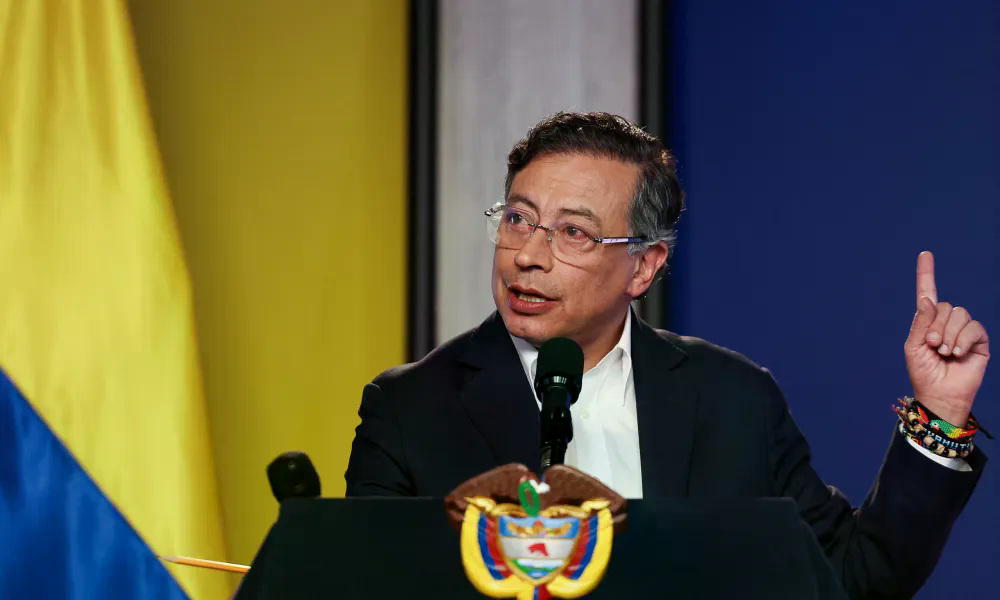
The United States Treasury has imposed sanctions on Colombian President Gustavo Petro, his family, and the country’s interior minister, Armando Benedetti. The move represents a significant escalation in tensions between Petro, a left-wing leader, and the Trump administration, which is known for its strong stance against drug trafficking.
In a statement, the US Treasury accused Petro of failing to control Colombia’s cocaine industry and allowing criminal groups to operate with impunity. The agency specifically referenced Petro’s “Total Peace” initiative, an effort aimed at ending Colombia’s decades-long internal conflict through dialogue with armed groups and organized crime.
“Since President Gustavo Petro came to power, cocaine production in Colombia has exploded to the highest rate in decades, flooding the United States and poisoning Americans,” said Treasury Secretary Scott Bessent in a statement. He added that Petro had allowed drug cartels to flourish and refused to take action against them.
Petro, who is active on social media, responded by calling the sanctions the result of long-standing Republican threats, including those from US Senator Bernie Moreno. On the platform X, he wrote that his wife, children, and he had been placed on the Office of Foreign Assets Control (OFAC) list. He claimed that Colombia had been effectively combating drug trafficking for years and indicated he would challenge the sanctions in U.S. courts.
“Not one step back and never on my knees,” Petro vowed, pledging to continue resisting the measures.
The sanctions place Petro among a small group of world leaders targeted by the U.S. government. Venezuelan President Nicolas Maduro has faced individual sanctions over human rights abuses, while Russian President Vladimir Putin was sanctioned following the 2022 invasion of Ukraine. However, unlike those cases, the sanctions against Petro come as he approaches the end of his term, which will conclude in 2026.
Petro is the first left-wing president in modern Colombian history, and his leadership has often clashed with the Trump administration. Their feud began after Trump returned to the White House in January 2021, when he prioritized mass deportations of undocumented immigrants. Petro publicly criticized these actions, leading to a tense exchange between the two leaders.
On January 26, Petro warned that Colombia would not accept deportation flights carrying migrants from the U.S., calling on the U.S. to treat Colombians as people, not criminals. In response, Trump threatened 30% tariffs on Colombian imports, prompting Petro to back down. Despite this, their disagreements have continued, particularly regarding immigration policies, human rights, and efforts to curb drug production.
Colombia remains the world’s largest producer of coca, the plant used to make cocaine. According to the United Nations, the country has seen a 53% increase in cocaine production since 2022, when Petro took office. Trump has increasingly focused on drug trafficking as part of his foreign policy, using economic pressure and military action to target drug smugglers in Latin America.
Since September 2, Trump has carried out missile strikes on vessels in the Caribbean and Pacific, claiming they were targeting drug traffickers. Petro has condemned these actions, arguing that they constitute extrajudicial killings. He highlighted the case of fisherman Alejandro Carranza, who died in one of the attacks, and called the strikes “murders.”
At the United Nations in September, Petro criticized the U.S. approach to the war on drugs, stating that it had failed and that his administration had implemented a more effective anti-trafficking strategy. He also joined protests in New York City opposing Israel’s war on Gaza, which led the Trump administration to revoke his visa for what it described as “reckless and incendiary actions.”
Later that month, the U.S. decertified Colombia as a partner in its drug war. Since then, relations between the two nations have deteriorated further.
This week, Trump announced on Truth Social that he would cut all aid to Colombia, the largest recipient of U.S. funds in South America. He also warned that the U.S. might take a more active role in the region if Petro does not do more to address the cocaine trade.
“You better close up these killing fields immediately, or the United States will close them up for you,” Trump wrote. He repeated the threat in a meeting with NATO Secretary-General Mark Rutte, warning that the U.S. would take “very serious action” against Petro and Colombia if necessary.
In response, Petro has threatened to sue Trump for slander, citing the former president’s derogatory remarks about him. The ongoing dispute has strained diplomatic ties between the two countries, with Colombia recently recalling its ambassador from Washington, D.C. Historically, Colombia has been a key U.S. ally in Latin America and a central partner in efforts to combat drug trafficking.


